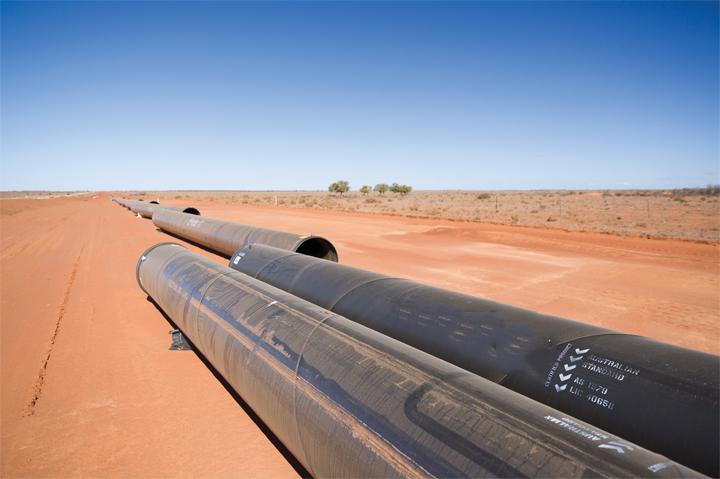
What are the Materials of Line Pipes?
Date:2024-06-14 keywords: pipeline steel, line pipe, line pipe materials
Definition and classification of line pipes:
Line pipe is a kind of pipeline material used to transport various substances, including seamless steel pipe (SMLS), spiral steel pipe (SSAW) and straight seam steel pipe (ERW/LSAW Pipe), etc., usually used to transport liquids, gases, solids, etc. According to different uses, pipeline steel pipes can be divided into several categories such as petroleum, natural gas, chemical, water supply, and sewage discharge.
Carbon steel is an alloy composed of iron and carbon, with a carbon content ranging from 0.08% to 2.11%. Carbon steel has high strength, good toughness and low cost, and is widely used in some common transportation situations.
2. Alloy steel
3. Stainless steel
Stainless steel is an alloy material with high corrosion resistance, high temperature strength and excellent mechanical properties. Generally include austenitic stainless steel, martensitic stainless steel, ferritic stainless steel, etc. Stainless steel can be used for a long time in various harsh environments such as acid and alkali, high temperature, low temperature and sea water. It also has good decorative properties and has been widely used in food, medical and other fields.
Comparison of different materials:
Line pipes of various materials have their own advantages and disadvantages, and they need to be selected according to specific conditions during application. The advantages of carbon steel are lower price, good plasticity and toughness, but poor corrosion resistance, so it is suitable for some ordinary transportation situations; the advantages of alloy steel are superior hardness, strength, wear resistance, heat resistance and other properties. , suitable for harsh conveying situations; stainless steel has the advantages of good corrosion resistance and high aesthetics, and is suitable for situations with high hygiene requirements. When selecting materials for pipeline steel pipes, comprehensive considerations need to be made based on the specific use environment, transportation medium, etc.
Conclusion:
The materials of line pipes include carbon steel, alloy steel, stainless steel, etc. Pipeline steel pipes of various materials have their own advantages and disadvantages, and they need to be selected according to specific conditions during application. At the same time, pipeline steel pipes are widely used in conveying liquids, gases, solids and other substances, and are an indispensable and important part of modern industrial production.
Line pipe is a kind of pipeline material used to transport various substances, including seamless steel pipe (SMLS), spiral steel pipe (SSAW) and straight seam steel pipe (ERW/LSAW Pipe), etc., usually used to transport liquids, gases, solids, etc. According to different uses, pipeline steel pipes can be divided into several categories such as petroleum, natural gas, chemical, water supply, and sewage discharge.
Materials of line pipes:
Carbon steel is an alloy composed of iron and carbon, with a carbon content ranging from 0.08% to 2.11%. Carbon steel has high strength, good toughness and low cost, and is widely used in some common transportation situations.
2. Alloy steel
Chromium, molybdenum, cobalt, titanium and other elements are added to alloy steel to improve the steel's hardness, strength, wear resistance, heat resistance, corrosion resistance and other properties. Its characteristics are between ordinary carbon steel and stainless steel. , it is widely used in harsh situations, such as marine environment, transportation under high temperature and high pressure conditions, etc.

3. Stainless steel
Stainless steel is an alloy material with high corrosion resistance, high temperature strength and excellent mechanical properties. Generally include austenitic stainless steel, martensitic stainless steel, ferritic stainless steel, etc. Stainless steel can be used for a long time in various harsh environments such as acid and alkali, high temperature, low temperature and sea water. It also has good decorative properties and has been widely used in food, medical and other fields.
Comparison of different materials:
Line pipes of various materials have their own advantages and disadvantages, and they need to be selected according to specific conditions during application. The advantages of carbon steel are lower price, good plasticity and toughness, but poor corrosion resistance, so it is suitable for some ordinary transportation situations; the advantages of alloy steel are superior hardness, strength, wear resistance, heat resistance and other properties. , suitable for harsh conveying situations; stainless steel has the advantages of good corrosion resistance and high aesthetics, and is suitable for situations with high hygiene requirements. When selecting materials for pipeline steel pipes, comprehensive considerations need to be made based on the specific use environment, transportation medium, etc.
Conclusion:
The materials of line pipes include carbon steel, alloy steel, stainless steel, etc. Pipeline steel pipes of various materials have their own advantages and disadvantages, and they need to be selected according to specific conditions during application. At the same time, pipeline steel pipes are widely used in conveying liquids, gases, solids and other substances, and are an indispensable and important part of modern industrial production.
News Update :
Types of Corrosion Protection for Carbon Steel Pipes...
©2017 Permanent Steel Manufacturing Co.,Ltd https://www.permanentsteel.com All Rights Reserved.
Terms of Sale|Privacy Policy


